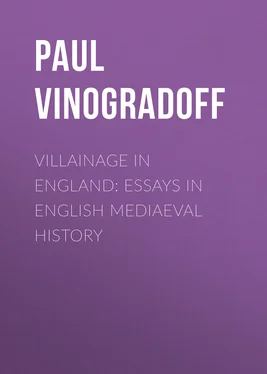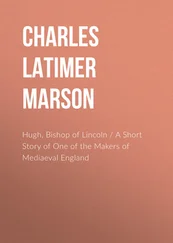Paul Vinogradoff - Villainage in England - Essays in English Mediaeval History
Здесь есть возможность читать онлайн «Paul Vinogradoff - Villainage in England - Essays in English Mediaeval History» — ознакомительный отрывок электронной книги совершенно бесплатно, а после прочтения отрывка купить полную версию. В некоторых случаях можно слушать аудио, скачать через торрент в формате fb2 и присутствует краткое содержание. Жанр: foreign_prose, Юриспруденция, История, foreign_edu, foreign_antique, на английском языке. Описание произведения, (предисловие) а так же отзывы посетителей доступны на портале библиотеки ЛибКат.
- Название:Villainage in England: Essays in English Mediaeval History
- Автор:
- Жанр:
- Год:неизвестен
- ISBN:нет данных
- Рейтинг книги:4 / 5. Голосов: 1
-
Избранное:Добавить в избранное
- Отзывы:
-
Ваша оценка:
- 80
- 1
- 2
- 3
- 4
- 5
Villainage in England: Essays in English Mediaeval History: краткое содержание, описание и аннотация
Предлагаем к чтению аннотацию, описание, краткое содержание или предисловие (зависит от того, что написал сам автор книги «Villainage in England: Essays in English Mediaeval History»). Если вы не нашли необходимую информацию о книге — напишите в комментариях, мы постараемся отыскать её.
Villainage in England: Essays in English Mediaeval History — читать онлайн ознакомительный отрывок
Ниже представлен текст книги, разбитый по страницам. Система сохранения места последней прочитанной страницы, позволяет с удобством читать онлайн бесплатно книгу «Villainage in England: Essays in English Mediaeval History», без необходимости каждый раз заново искать на чём Вы остановились. Поставьте закладку, и сможете в любой момент перейти на страницу, на которой закончили чтение.
Интервал:
Закладка:
Nature of tenancy in ancient demesne.
Now all that has been said hitherto applied to 'the tenants in ancient demesne' indiscriminately, without regard to any diversity of classes among them. Hitherto I have not noticed any such diversity, and in so doing I am warranted by the authorities. Those authorities commonly speak of 'men' or 'tenants in ancient demesne' without any further qualification 214 214 I will here cite Bract. Note-book, pl. 1237, as an instance, although there is hardly any call for quotation on this point.
. Sometimes the expression 'condition of ancient demesne' also is used. But closer examination shows a variety of classes on the privileged soil, and leads to a number of difficult and interesting problems.
To begin with, the nature of the tenancy in general has been much contested. As to the law of later times Mr. Elton puts the case in this way: 'There is great confusion in the law books respecting this tenure. The copyholders of these manors are sometimes called tenants in ancient demesne, and land held in this tenure is said to pass by surrender and admittance. This appears to be inaccurate. It is only the freeholders who are tenants in ancient demesne, and their land passes by common law conveyances without the instrumentality of the lord. Even Sir W. Blackstone seems to have been misled upon this point. There are however, as a rule, in manors of ancient demesne, customary freeholders and sometimes copyholders at the will of the lord, as well as the true tenants in ancient demesne 215 215 Law of Copyhold, 8. Cf. the same author's Tenures in Kent, 182.
.' Now such a description seems strangely out of keeping with the history of the tenure. Blackstone speaks of privileged copyhold as descended from privileged villainage 216 216 Blackstone, Law Tracts, ii., especially pp. 128, 129.
; and as to the condition in the thirteenth century of those 'men' or 'tenants in ancient demesne' of whom we have been speaking, there can be no doubt. Bracton and his followers lay down quite distinctly that their tenure is villainage though privileged villainage. The men of ancient demesne are men of free blood holding in villainage 217 217 Bracton: 'liberi de condicione … tenentes villenagium.' Britton: 'hommes de franc saunc.'
. And to take up the special point mentioned by Mr. Elton—conveyance by surrender and admittance is a quite necessary feature of the tenure 218 218 Stoneleigh Reg., 75: 'Item si quis de voluntate et assensu domini facto fine cum domino voluerit dare tenementum suum ad opus alicuius, ueniet in curia cum virga et sursum reddet huiusmodi tenementum ad manum domini sine carta ad opus ementis vel cui datur et ballivus domini habitis prius herietis et aliis de iure domino debitis dictum tenementum emptori seu cui dabitur et heredibus suis secundum consuetudinem manerii habendum et tenendum liberabit in (cum corr. ?) virga. Et dictus recipiens tunc faciet finem cum domino prout possunt conuenire.... Item extraneus non debet vocari ad warantum in placito terre in curia de Stonle quia sokemanni non possunt feoffare alios per cartas cum ipsi nullas habeant de rege. Set si quos feoffauerint de licencia domini sine carta, ipsos feoffant secundum consuetudinem manerii prout continetur in rotulo curie de anno xx Regis Edwardi filii Regis Edwardi in placito terre inter,' etc.
: conveyance by charter makes the land freehold and destroys its ancient demesne condition 219 219 Placitorum Abbrev. 233, Berks. Cf. Britton, i. 287, note c.
. But although this is so clear in the authorities of the thirteenth century, there is undoubtedly a great deal of confusion in later law books, and reasons are not wanting which may account for this fact and for the doctrine propounded by Mr. Elton in conformity with certain modern treatises and decisions.
Classes of tenantry.
We may start with the observation, that privileged villains or villain socmen are not the only people to be found on the soil of the ancient demesne. There are free tenants there and pure villains too 220 220 Bracton, f. 7.
. Free socage is often mentioned in these manors, and it is frequently pleaded in order to get a trial transferred to the Common Law Courts. When the question is raised whether a tenement is free or villain socage, the fact that it has been conveyed by feoffment and charter is treated, as has just been pointed out, as establishing its freehold character and subjecting it to the ordinary common law procedure 221 221 Jurate et Assise, 45 Henry III, Placitorum Abbr., p. 150: 'Et Galfridus de Praule bene cognoscit quod predictum manerium est antiquum dominicum Dom. Regis set dicit quod predictum tenementum est liberum tenementum ita quod assisa debet inde fieri.... Dicit enim quod ipse feofatus est de predicto tenemento de quodam Willelmo Harold per cartam suam quam profert.... Et juratores quesiti si antecessores ejusdem Willelmi feofati fuerunt per cartam vel si aliquis de tenura illa unquam placitaverunt per diversa brevia vel non, dicunt quod non recolunt.'
. On the other hand, registers and extents of ancient demesne manors sometimes treat separately of 'nativi' or 'villani' as distinguished from the regular customary tenants, and describe their services as being particularly base 222 222 Stoneleigh Reg., 12: 'Fuerunt eciam tunc quatuor natiui siue serui in le lone quorum quilibet nouum mesuagium et unum quartronum terre cum pertinenciis per seruicia subscripta videlicet leuando furcas, etc. … et debebant … redimere sanguinem suum et dare auxilium domino ad festum S ti . Michaelis scilicet ayde et facere braseum Domini et alia seruicia seruilia.' As to some details, see Dugdale, Antiquities of Warwickshire, i. 176.
. In trials it is quite a common thing for a lord, when accused of having altered the services, to plead that the plaintiffs were his villains to be treated at will. Attempts were made in such cases to take advantage of the general term 'men of ancient demesne,' and to argue that all the population on the crown manors must be of the same condition, the difference of rank applying only to the amount and the kind of services, but not to their certainty, which ought to be taken for granted 223 223 Coram Rege, Pasch. 1 Edw. II, m. 26: '(Maugerus) defendit vim et injuriam quando, etc. Et dicit quod qualitercunque iidem homines asserant se et antecessores suos tenentes, etc. certa seruicia dominis de Wycle antecessoribus ipsius Maugeri et sibi fecisse et facere debere, quod omnes antecessores sui domini de eodem manerio extiterunt seisiti de predictis hominibus et eorum antecessoribus tenentibus tenementa quae ipsi modo tenent ibidem ut de uillanis suis taillabilibus alto et basso ad voluntatem ipsorum dominorum et redempcionem sanguinis et alia villana seruicia et incerta et villanas consuetudines faciendo a tempore quo non extat memoria.... Et predicti homines dicunt quod ipsi sunt tenentes de antiquo dominico, etc., prout curie satis liquet et quod omnes tenentes in dominico Regis per certa seruicia et certas consuetudines tenent et tenere debent, quidam per maiora et quidam per minora secundum consuetudinem, set semper per certa,' etc. Coram Rege, Mich. 5 Edw. II, m. 77, v: 'Nec dedici potest quia tenentes de antiquo dominico certa seruicia et certas consuetudines tenentur facere et non ad voluntatem dominorum.'
. But strictly and legally the lord's plea was undoubtedly good: the courts admitted it, and when it was put forward proceeded to examine the question of fact whether the lord had been actually seised of certain or of uncertain services 224 224 Y.B., M., 15 Edw. II, p. 455: ' Bouser : Auxint bien sont tenans en auncien demesne ascuns vileins et ascuns autres come ailleurs et les sokemans plederent par le petit brief de droit et les vileyns nient. Herle : Il semble que assets est il traverse de votre brief, car vous dites que vous tenez par certeyn service … et il dit que vous estes son vilein et que il et ses predecessors ont este seisiz de tailler vous et vos auncestres haut et bas, etc. Et stetit verificare.' Cf. Bract. Note-book, pl. 1230.
. It is of considerable importance to note that the difference between villains pure and villains privileged was sometimes connected with the distinction between the lord's demesne and the tenant's land in the manor 225 225 Bracton, 209: 'Item est manerium domini regis et dominicum in manerio, et sic plura genera hominum in manerio, vel quia ab initio vel quia mutato villenagio.' The meaning of this badly worded passage is made clearer by a comparison with f. 7: 'In dominico domini regis plura sunt genera hominum; sunt enim ibi servi sive nativi ante conquestum, in conquestu, et post, et tenent villenagia et per villana servitia et incerta qui usque in hodiernum diem villanas faciunt consuetudines et incertas et quicquid eis preceptum fuerit (dum tamen licitum et honestum).... Est etiam aliud genus hominum in maneriis domini regis, et tenent de dominico et per easdem consuetudines et servitia villana, per quae supradicti (villani socmanni) et non in villenagio, nec sunt servi nec fuerunt in conquestu, ut primi, sed per quandam conventionem quam cum dominis fecerunt.' Cf. Elton, Tenures of Kent, 180.
. The demesne proper was frank fee in the hands of the lord, and could be used by him at his pleasure. If he chose to grant it away to villains in pure villainage, the holdings thus formed could have no claim to rank as privileged land. It was assumed that some such holdings had been formed at the very beginning, as it were, that is at a time beyond memory of man, but tenements at will could be created at a later time on approved waste or on soil that had escheated to the lord and in this way passed through his demesne 226 226 Fitzherbert, Abr. Monstrav. 3 (Pasch. 41 Edw. III). ' Kirt : Les tenements queux ils teignent fuerent en auncien temps entre les maines les villeins queux deuirrent sans heire perque les tenements fuerent seisies en maine le seigneur et puis le senescal le seigneur lessa mesme ceux terres par rolle a mesme ceux ore tenants a tener a volunte del seigneur fesaunt certain services; issint ne sont ils forsque tenants a volunte le seigneur.'
. One of the reasons of later confusion must be looked for in the fact that the pure villain holdings gradually got to be recognised at law as copyhold or base customary tenures. They were thus brought dangerously near to ancient demesne socage, which was originally nothing but base customary tenure. The very fact of copyhold thus gaining on villain socage may have pushed this last on towards freehold. Already the Old Natura Brevium does not know exactly how to make distinctions. It speaks of three species of socage—free, ancient demesne, and base. The line is soon drawn between the first two, but the third kind is said to be held by uncertain services, and sued by writ of 'Monstraverunt' instead of having the writs of right and 'Monstraverunt' of ancient demesne socage 227 227 Natura Brevium, f. 105. Cf. 16.
. Probably what is meant is a species of copyhold which is not socage, and the writ of 'Monstraverunt' attributed to it may perhaps be the plaint or petition which is the initial move in a suit for the protection of copyhold in the manorial court.
Интервал:
Закладка:
Похожие книги на «Villainage in England: Essays in English Mediaeval History»
Представляем Вашему вниманию похожие книги на «Villainage in England: Essays in English Mediaeval History» списком для выбора. Мы отобрали схожую по названию и смыслу литературу в надежде предоставить читателям больше вариантов отыскать новые, интересные, ещё непрочитанные произведения.
Обсуждение, отзывы о книге «Villainage in England: Essays in English Mediaeval History» и просто собственные мнения читателей. Оставьте ваши комментарии, напишите, что Вы думаете о произведении, его смысле или главных героях. Укажите что конкретно понравилось, а что нет, и почему Вы так считаете.












